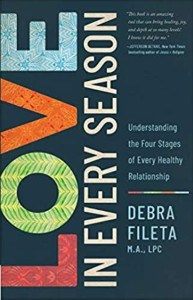John Fuller: Well, I wonder if you’ve ever considered what season you’re experiencing in your marriage. Is the relationship with your spouse warm and sizzling or are you feeling a little bit chilly right now? Today on Focus on the Family with Jim Daly, we’ll explore how you can navigate those different seasons and discover a stronger marriage as a result. Thanks for joining us. Your host is Focus president and author Jim Daly, and I’m John Fuller.
Jim Daly: John, I remember, uh, how it felt when Jean and I fell in love. At fir- you know, at first I was like, “I’m gonna try to do this life single.” And then I met Jean and went, “Wow. I think she’s the one I wanna marry.” (laughs) It was that quick. So I, my speedometer went from 0 to 120 pretty fast and, uh, just those feelings and, you know, wow, I can’t get enough of talking with her late into the night. I remember she worked at a vet clinic. I would bring her dinner, uh, from, and I was living 90 miles away. That was quite a dinner run.
John: That’s commitment (laughs).
Jim: (laughs) But whatever it took, that’s what I was-
John: Yeah.
Jim: Expressing to her and I think she obviously got the message that I was really interested (laughs) and thankfully she said yes. Uh, but you know, like the weather, marriages do go through seasons, and we’ve had our seasons. And some are filled with excitement and warmth, kinda like summer and spring, while others can be chilly and mundane seasons like winter and fall. But how we manage those seasons determines whether or not we grow and become better as a couple, which is the goal. And I know everyone’s gonna benefit from our conversation today with Debra Fileta. Uh, she and her husband John have lived through the ups and downs of marriage and Debra has helped many couples in her counseling practice walk through these seasons as well.
John: And as you mentioned, she is a counselor and a blogger, a podcaster, an author. Um, she hosts the podcast Love and Relationships with Debra Fileta and, uh, together she and John have four children. Uh, we’re gonna hear about her book today called Love in Every Season: Understanding the Four Stages of Every Healthy Relationship. And you can find that at focusonthefamily.com/broadcast.
Jim: Debra, welcome back to Focus.
Debra Fileta: Thank you. It’s so good to be back.
Jim: Yeah. Thank you for coming all the way from Pennsylvania. That’s quite a trek.
Debra: It is, it is quite a trek, but it was worth it.
John: Good.
Jim: Well, listen, uh, before we get into the four seasons, I’m wondering how did John and you meet and fall in love? Since I kinda poured my Jean story out, what’s your story?
Debra: Yeah. Well, we didn’t go from 0 to 120 like you did.
Jim: (laughs) Well, I wasn’t in the, I was thinking, “Okay, Lord. I’ll live my life single if that’s what you want me to do.” And then, boom, I met Jean and went, “Okay, Lord, is this good?” (laughs)
Debra: Yeah. You know, John and I met at a conference up in Boston. And, um, we developed a friendship very quickly and for me it was awhile until I knew that he was the person I wanted to marry.
Jim: Oh, so you had to simmer a little bit there?
Debra: I had to let it simmer.
Jim: Okay.
Debra: I had to watch the seasons go by. For him though, he had a feeling right away when he met me that, “I wanna marry this girl.” But what he says is he also had to let the seasons go by because seasons in a relationship reveal a lot, you know? It’s not just about what you feel, it’s about what you see as time passes.
Jim: Well, obviously that, that concept was beginning to bubble in you. Uh, you didn’t write the book right after being married, but-
Debra: Right.
Jim: Go ahead and define for us what the seasons of marriage are. I, I love the fact that God is so plainly seen if we-
Debra: Yes.
Jim: Just stop and look.
Debra: I agree.
Jim: Seasons of life. How he is like our father, right? He is our father and unfortunately he’s the father of a lot of teenagers, meaning us-
Debra: Yeah.
Jim: People that rebel. But the point of it is is that nature itself and God’s nature specifically does show us the very nature and character of God, right?
Debra: Right. Exactly. And just as in nature we see four different seasons, we pass through four seasons, especially for those of us who live in places like Pennsylvania, we see every season and it looks so different. You see the beautiful colors of spring. It’s a beautiful season. And then you move into this season of summer when things start to get hot, right? You start shedding your layers because it’s warm and you’re going to the beach and enjoying the heat of summer. Then you go into the colors of fall and the, the true colors of the trees start to shine through. And then all the way into the season of winter when things start to kind of cool off. And when you think about it, it is the perfect backdrop to relationships. A- As a licensed counselor, the analogy of the seasons was just so clear in the relationships that I worked with of people go from spring to summer, to fall and winter, all in one relationship and then they repeat, you know?
Jim: But in there too, and that’s the question I wanted to ask, is those seasons, uh, you know, they… A, they’re not always chronological.
Debra: They’re not.
Jim: And B, they don’t match, obviously, the tilt of the earth, uh, in marriage.
Debra: Right.
Jim: But the point is they just describe how marriage flows.
Debra: Right.
Jim: But some seasons can be years in length and maybe months, and maybe even a week or a day I would assume.
Debra: Yeah. They don’t all, they don’t happen at the same time. They don’t look the same for each couple, but the beauty is that each season has the power to reveal something about your relationship, about you. Each season has the power to help you make or break your relationship depending on how you choose to navigate that season, and that’s why they’re so important for us to recognize. If we’re not aware of them, we can’t take advantage of them.
Jim: Now here’s an odd question, but uh, can you be in two seasons at once?
Debra: I believe so. I, I think anything can happen, you know, there’s no rules.
Jim: What does that look like in your practice with helping couples? Uh, what does a couple that’s in two seasons at the same time look like?
Debra: Well, ultimately it’s focusing on the most important thing for them to navigate, you know? So let’s say they’re in the season of fall, but they also feel the emotions of spring, which we’ll get to, you know, those heightened feelings. They love each other, but maybe they go through these explosive fights. You know, the season of fall is kind of the season of conflict. And so learning how to hold onto that affection, but then navigate conflict in a healthy way.
Jim: A- Another aspect, and this is all groundwork and we will get to the definition of the seasons and start to talk about them practically in marriage, but regardless of what season of marriage we’re in, it’s critical for us to identify unhealthy patterns of our own behavior. And in fact, you outlined three personality types of people who, uh, give too much. What are they?
Debra: Well, before we get into that, I think it’s important to back up and explain that in the season of spring, spring is a season of growth.
Jim: Mm-hmm.
Debra: You know, it’s the time in your relationship when things begin to grow and stretch and expand, but you can’t have growth without give and take, right? And that’s where some people get stuck. And these personalities really make you get stuck if you’re not careful because we’ve got people on one side who give too much and then we’ve got people on the other side who give too little. And if you’ve got one of those people in your relationship or maybe both, it’s gonna inhibit how you grow.
Jim: And when you look at humanity though, I would think that that is the issue. I mean, the Lord is even instructing us to love our neighbor as ourselves. I think that kinda fits in that space of a person who, because of how they grew up or the, you know, the things that they learned, they either are givers or takers-
Debra: Right.
Jim: Another way to say that, emotionally.
Debra: Right.
Jim: Uh, so describe, go ahead and describe those types again so we fully understand that.
Debra: Yeah. You know, on one side of the spectrum you have someone who gives too much. And I think before we can just simply say, “Well, stop giving too much.” You know, that’s, it’s easy to say that. “Well, just stop giving too much.” But you have to get to the root of why a person gives too much in order to help them stop giving too much. So when-
Jim: What about, what about the person, the Christian who says, “Well, it’s Godly to be on that side of the equation. I give even when it hurts to give.”
Debra: Right. I think some people, uh, misunderstand and they view selflessness as passivity. They kinda mistake the two. They’re being passive, but they actually think they’re being selfless. And you brought up the scripture just now that says, “Love your neighbor as you love yourself.” I think Jesus could’ve said, “Love your neighbor more than you love yourself. Love your neighbor, but don’t love yourself.” But the command is clear, “Love your neighbor as you love yourself.” There’s an equality there. To me that represents an important give and take. And so why do people give too much? Well, there’s many different reasons, but sometimes, you know, because of how you were raised, your family of origin, maybe you grew up in a family where you were kind of the one that was keeping the peace. And so, you grow up with chaos and your job is to control the chaos, so you become the rescuer.
I’m gonna save everybody. That’s my job. That’s my role. And you take that role into your romantic relationships. You give too much because you’re rescuing people. And maybe you even engage in unhealthy relationships, or maybe you’re a people pleaser. You grow up in a family or in experiences where you want everyone to be happy. You’re trying to control the emotional atmosphere and then in your romantic relationships, you become someone that pleases people, or maybe you’re insecure. Maybe you grow up sort of feeling this insecurity underlying and you get your value from the relationships that you engage in, so you become a person who goes into romantic relationships feeling insecure and feeling that you have to give and give and give and give in order to be loved.
Jim: And these things, sometimes we’re not even conscious of those triggers, those behaviors that are, uh, kinda putting us in that position of being a giver, a taker, or what have you, right?
Debra: Sometimes we don’t even notice that we’re doing it. We don’t know why that we’re doing it. And this is why, you know, I’m gonna toot the horn of counseling. Obviously I’m a counselor, but I really believe that there is power in getting to the root of why we do what we do. I think a lot of times in our faith based culture, we just wanna snip the weed. This is unhealthy. Let’s just get this out of my life. We try to snip it and it grows back, because we’re not getting to the root of why it’s there. We’re not getting to those, w- whether it be childhood wounds-
Jim: Yeah. What makes me behave like this?
Debra: Sins and struggles. What makes me behave like this?
Jim: Yeah.
Debra: And how do I change my behavior?
Jim: Which is part of why I’m sure you wrote the book, right? You saw his pattern over and over again in your practice. Uh, let’s get to a practical story. There’s, uh, one in your book about a woman you counseled who struggled with trust issues. I think so many women, and trust is a big deal, um, and for women particularly, uh, that is perhaps even top of the list. Uh, she had the trust issues because of how her dad treated her mom. And I, I’m sure you can give us kinda the top level of what was going on there and what developed into trust concerns for this patient of yours.
Debra: Right. When, when you work with somebody who has a past history of watching infidelity or affairs in their parent’s marriage, that kinda becomes the baseline or norm for them. And that’s kinda where this woman was, seeing unhealthy patterns in her parent’s relationship starting to then affect her belief about men and relationships and can they really be trusted? So on the opposite end of this spectrum, she goes into a relationship giving too little. Not giving too much, but giving too little because she’s afraid to trust.
John: She’s protecting herself.
Debra: She’s protecting her heart. She’s protecting her emotions. No matter what this guy did to prove his trustworthiness, she was struggling with trust because of her past wounds and her past baggage.
Jim: What is, uh, what does a person do in that context if you can… Hey, someone hearing this right now, “That is me. That’s what I do.” Uh, what are some things that she can do today that might help her in a better direction?
Debra: Ultimately, the more healed we are from our past wounds, the more we can thrive in our present. And when we’re struggling in the present, many times it’s a sign that there’s some past wounds that need to be healed. And I think as a counselor, I will tell people the key is to differentiate the voices of my past versus the voices of God in, in the present. Because sometimes our past speaks so much louder than the voice of God’s spirit in our present, those past things that we’ve experienced. And if we don’t get to the root and begin healing them, they’re gonna continue affecting our present.
John: Today on Focus on the Family, we’re talking with Debra Fileta and, uh, she’s written this great book Love in Every Season. And, uh, we’ll get into more about the seasons here as progress, but let me just say, uh, the book is available from us here at Focus on the Family. We’d love to send a copy to you. Get in touch and we’ll tell you more. 800 the letter A and the word FAMILY, or stop by focusonthefamily.com/broadcast.
Jim: Debra, let’s dive into spring as the first of the season descriptions. You identify it as the season of attraction. I think that’s, you know, when everybody is coupling up, whether it’s the birds or the-
Debra: Yeah.
Jim: The people. Uh, you’ve got a great story about when you and John, I think you were holding hands for the first time. Tell us about that.
Debra: Yeah. You know, spring is the season when affection is high, emotions are, you know, really intense. That’s kinda how you define that season, usually in the beginning of a relationship. And so with John and I, when we met, I remember the first time we held hands felt like electric, you know? We were fr- we were in the friend stage. We were watching a movie and I think our pinkies kinda touched on the, uh, on the chair and we held hands for the first time and you just get these overwhelming feelings. Not that I don’t feeling that overwhelming electricity 14 years into marriage, but it’s different, you know?
Jim: (laughs)
Debra: It, it’s part of your norm-
Jim: The pitter-patter is not the same.
Debra: …now. And so that’s the importance of the season of spring. It’s the season of blossoming and blooming of affection and emotion. And it’s the season of growth. It’s the season of planting good season and uprooting weeds, the things that we don’t wanna see in our relationship. So, in nature and in relationships, the season of spring is really important.
Jim: Yeah, that’s a great description. You’ve identified something called the four laws of attraction. Explain what those are.
Debra: Attraction is multifaceted. I think when we think of the word attraction we automatically assume it’s physical attraction. How attracted am I to someone? But you know, attraction is four layers. It’s not just one thing. There is physical attraction, but there’s also personal attraction. How do our personalities mesh? There is mental and emotional attraction, you know? When you, can you talk about your feelings and ideas and opinions and have those conversations? And then there’s spiritual attraction where you’re drawn to somebody because of their relationship with Jesus. And it was interesting when I did, when I wrote this book, I, I surveyed singles to see what they thought was most important in with regard to attraction. And overwhelmingly a majority of them said it was spiritual attraction. When you look at how we do relationships, that’s not always where we begin. We say spiritual attraction is the most important, but often times we get caught up on the physical attraction component. But we in marriage know that physical attraction is one of the only things that wanes as time passes, because we get older. We have wrinkles. Things start to sag.
Jim: (laughs)
Debra: But everything else increases when you’ve got strong spiritual attraction and mental/emotion attraction, personal attraction. So really, that’s what we’ve gotta be fueling in-
Jim: Yeah.
Debra: Our marriage relationships.
Jim: And I think in human relationships, I think it’s fair to say that, that physical attraction is kinda the gateway to the relationship. Usually two people are seeing each other you’re having thoughts of, “Wow, she’s really pretty.” Or, “He’s really handsome.” Or, whatever it might be. But it usually is in that category and it’s a short, like you say, a short-lived thing ’cause them you’re moving to emotion connection, attractiveness that way, spiritual attractiveness. But sometimes we discount, I think in the Christian community particularly, we discount the purpose of physical attraction and the world does it the other way. It lingers there. It stays in physical attraction and tries to build a relationship simply on physical attraction. And that’s, that’s a very flimsy part of the relationship laws, correct?
Debra: Yeah. You know, it is important to be physically attracted to somebody, but at the same time, we’ve gotta keep it into proper perspective. I know plenty of people who are physically attracted to somebody and then they get to know them and the physical attraction disappears.
John: Mm-hmm.
Debra: You know? Because the personality is just overwhelming. But then the opposite happens when sometimes maybe you don’t feel totally attracted to somebody, but then you see all of the other qualities and characteristics and the attra- the physical attraction also increases. That’s why it’s important for us to understand that attraction is multifaceted. It is not just one thing. The definition of attraction is, “The desire to move towards somebody.” Kind of like a magnet. You’re attracted to them. And when you have these components, it really keeps your relationship strong.
John: Mm-hmm.
Jim: Jean and I, um, we did almost accidentally rekindle the spiritual connection because we began to get into a much better habit of praying together, reading the word together every morning to which, uh, you know, we’ve been able to continue that. But it’s interesting how busyness and obligations and schedule and all those things take you away from the very things that allow you to do some of this intimacy work-
Debra: Right.
Jim: In these four areas. So what about the couple that feels like, you know, spiritually they’re not connecting? What can they do differently?
Debra: You know, I think first and foremost we have to take a good assessment of how we’re each doing spiritually standing alone, because-
Jim: That’s not me giving my wife a score or my wife giving me a score or are you-
Debra: Right.
Jim: Saying, y- you’re saying for yourself, how are you doing?
Debra: For yourself. You gotta stop and look at your own walk with the Lord. Before you desire it in your marriage, you’ve gotta take inventory of how you’re doing standing alone, because spiritual intimacy doesn’t just happen. It’s the overflow of your heart for Christ working together. Your, the overflow of your heart, the overflow of your spouse’s heart. If you look at it kinda like a fountain, what’s overflowing from us, that’s what relational, spiritual intimacy looks like. So that’s where we have to begin. It’s not by nagging your spouse to do devotions with you more or nagging them to pray with you more, but beginning to set that example in your own life and inviting them on that journey with you.
Jim: What about that frustration, uh, you know, I’ll just try to play the role of the, of the girlfriend (laughs). You know, where the wife is saying, “I am there, but my husband just isn’t interested in spiritual things. He’s not responding to my nudges and my leanings.” Um, how can she, I guess, get some peace in her life in that area even if her husband isn’t there quite yet? I mean, do you simply go to the prayer closet? Do you nudge gently? You said nagging. Nagging can be a very overt-
Debra: Mm-hmm.
Jim: Operation, but w- what are some things to that, for that wife who she’s there. She’s done the self-assessment. “I’m doing pretty well. I just wish my husband were there with me.”
Debra: I think sometimes in marriage, um, especially because we’ve been taught about our roles in marriage, I think often times women feel that they’re not allowed to take the lead with spiritual conversations and spiritual intimacy. But I always encourage a woman, if you feel like you are strong in that area, then allow God to use you in that area. Take the lead in your relationship of moving your marriage to the Lord. So, pray out loud for your husband. Ask him, “How can I be praying for you?” Maybe even suggest a time that you could sit down and pray. Um, suggest a time where you could sit down and read God’s word together.
I think sometimes in our hesitancy to lead the way, we become passive and we don’t do anything spiritually speaking in our relationship. So I say if you’re at a good place, um, take advantage of that. Invite your husband into the process and most of the time, eventually, they will follow suit. So I think it’s a beautiful thing and if it’s something they’re unwilling to do, you continue bringing it before the Lord. You continue modeling it in your own personal life and trust that the Lord is working where you can’t work.
Jim: Exactly what scripture says to do actually. Uh, Debra, moving to summer. And we’re gonna cover, uh, spring we covered. We’re gonna do summer and then we’ll have you back next time, we’ll talk about uh, fall and winter. Uh, but moving to summer, you give the example of how building emotional connection as a couple is like a spider web. This was really interesting to me. And you talked about the strength of the spider web. Why is that a good analogy for us?
Debra: Well, spider webs are something we see often in summer. And summer is the season when things get hot, right? Summer is that season of developing intimacy in a relationship and really having to work at that intimacy. And one of the key components is emotional intimacy. When you look at a spider’s web, there’s so many tiny little strings connecting it together, and that’s kinda how I view emotional intimacy in marriage. It’s not just one thing, it’s a bunch of tiny little strings. A spider’s web looks so fragile, but really, it is strong. It is stronger than the material used for a bulletproof vest.
Jim: That’s amazing when you think of that.
Debra: That just goes to show you, that little thread, and that’s kinda how I see emotional connection in marriage. It’s a bunch of tiny little strings from physical connection, to emotional connection, to spiritual connection, things that you’re working on to continue connecting those strings to your spouse.
Jim: In fact, you tried to make an emotional connection with your husband John. I thought this was extraordinary. I was giving you applause when I read this in the book. Describe what happened.
Debra: Well, when John and I were dating, he was doing some really, uh, intellectual research at Harvard Medical School. And to be frank, it was boring.
Jim: (laughs)
Debra: But because I was so in love with him, I decided I’m gonna read up on what he’s doing. I wanna learn. I want this to be another string of emotional connection that ties us together. So I read up on his research and I remember talking to him about it one day and he was shocked. He’s like, “You’ve really read my research? This is amazing.” You know? But here’s the thing, that was in dating. And somewhere along the way, we stopped doing that. And that’s where we have to be intention about building those strings. Just the other day, John’s getting really into chess these days. He’s like really trying to train to, to get better at his chess game. And it’s not something I’m very interested in, but the other day I asked him to kinda teach me how to play and help me get a little bit better, because I want to build the emotional strings in our relationship and he does the same. There’s things that he’s absolutely not interested in by default, but he chooses to become interested in those things because he wants to build another string that ties us together.
Jim: Uh, and you know what, John, here’s a heads-up with my boys. You teach them chess and then eventually they start beating you.
John: Yeah (laughs).
Jim: (laughs)
Debra: They will.
Jim: So it’s a very humbling experience.
Debra: And that is my plan.
Jim: (laughs)
Debra: I will eventually get good enough (laughs).
John: (laughs)
Jim: That’d make it even tougher when your spouse is beating you. Oh-no, but uh, it’s fun. It’s good to see. You h- you have a story about glassblowing, again, another great illustration in this category. But, uh, you and John went to this glassblowing class. I, I don’t know if I would have the patience for that, but tell us what happened.
Debra: You know, when we talk about building connection with your spouse, a big part of it is that spiritual connection and this is where it came in. John and I went to a glassblowing class, um, something that he has always enjoyed and wanted to try. And it was amazing when they put the fire on the glass. It turns to putty. It’s 2,000 degrees Fahrenheit and it just turns to putty and you can shape it however you want. And it just reminded me in marriage, you know, when the Lord sometimes puts us in a, in a hard place or a place of fire, it’s because he’s shaping us and molding us and helping us to kinda fit our marriage to, to become better so that our relationship becomes better.
John: Yeah.
Jim: You know, maybe that’s a good place to end here on day one Debra, is this concept where when you’re stuck, what is something you can do? There’s so much suffering in silence, even in Christian marriages. If a person is hearing this today saying, “Okay, I think we’ve got some issues.” What can they do?
Debra: Well, like you said, the first step is to acknowledge it, you know? To say, “We’re struggling.” I think sometimes we’re afraid to acknowledge it. Nobody wants to come face to face with the fact that they’re struggling, so they just keep pressing on-
Jim: Right, we just keep going.
Debra: Without stopping to really get help. And so call those phone lines, get plugged in with a counselor, um, start getting the work of becoming healthy while standing alone, even if your spouse isn’t willing to join you, because as you begin to change, it will begin to change the dynamic of the marriage as well.
Jim: Well, that’s so true. We would be honored to help your family any way we can. Thanks to the donors who support this ministry, we do have a team of caring Christian counseling who are available to talk with you, to pray with you, and to point you, uh, toward ongoing resources in your local area. We also have Hope Restored where we provide intensive counseling over a four-day period, uh, for couples who may be on the brink of divorce. But the good news is that four out of five of those couples, over 80% of those who attend Hope Restored are still together two years later and that’s a testament to God’s grace on that program.
John: Mm-hmm.
Jim: Uh, so Focus is here to help you and we’ve got great resources like Debra’s book, Love in Every Season. I know your marriage will benefit from this book and I hope you’ll get a copy from us. If not for you, get one for another couple that you know is struggling. Uh, make a monthly pledge of any amount to Focus on the Family and we’ll send you Debra’s book a- as our way of saying thanks for partnering in the ministry. And let me say in advance, thank you for your generosity.
John: Yeah, we really do appreciate it. And if a monthly pledge is more than you can afford right now, a one-time gift makes a difference. And so we hope to hear from you either way very soon. How about today? Our number is 800, the letter A, and the word FAMILY. 800-232-6459. Uh, we can also tell you more about our counseling team and Hope Restored. Um, you can find those details as well and donate, uh, at our website. That’s focusonthefamily.com/broadcast. Well, plan now to join us tomorrow for more insights from Debra Fileta about navigating the fall and winter seasons of marriage. That’s next time on Focus on the Family with Jim Daly. I’m John Fuller inviting you back then as we once more help you and your family thrive in Christ.























